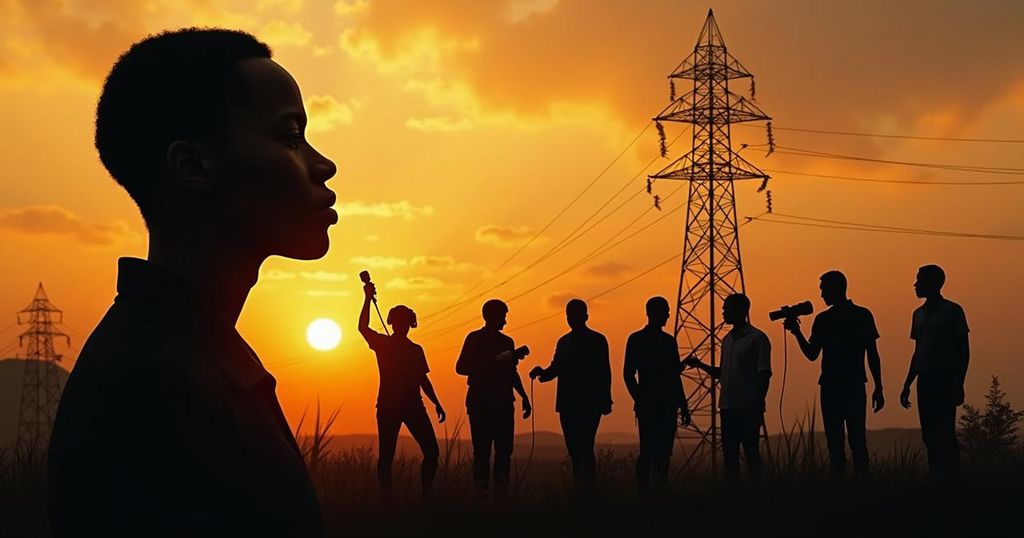Murder of Radio Maria Coordinator Highlights Perils for Journalists in Goma

Edmond Bahati Monja, coordinator of Radio Maria/Goma, was murdered on September 27 by armed men near his home in Goma, DRC. This incident highlights the increasing dangers journalists face in conflict zones, particularly amid the ongoing violence from the M23 armed group. His death is part of a troubling trend, as numerous journalists have been killed in the region for their work investigating armed group violence. The situation in Goma remains precarious, with increasing crime and political instability despite a declared state of siege.
On the evening of September 27, Edmond Bahati Monja, the coordinator of Radio Maria/Goma, was tragically murdered near his residence in the Ndosho district of Goma, located in the eastern region of the Democratic Republic of Congo. An armed assault led to his death, executed by assailants who approached him shortly after committing an earlier robbery. Witnesses reported that Bahati was shot multiple times at close range, leaving behind a grieving family consisting of his wife and three children. His murder adds to the grim reality faced by journalists in the area, where reporting on the pervasive violence and insecurity becomes a life-threatening endeavor. The tragic event underscores the risks faced by journalists who dare to expose the truth in conflict zones, particularly in regions increasingly ravaged by armed militias, such as the M23 movement. The context of Bahati’s murder reveals the complexities of the security situation in Goma. The city has been under siege by M23 militants, compelling the Congolese army to form alliances with various armed groups, including those known as Wazalendo, to bolster local defenses. However, this collaboration has inadvertently intensified violence and crime, leading to rampant robberies and murders. Community radio stations like Radio Maria/Goma play a crucial role in disseminating information but face severe intimidation, including phone threats and harassment. The situation has escalated despite a state of siege declared on May 6, 2021, demonstrating the ongoing peril faced by civilians and journalists alike in North Kivu. Cardinal Fridolin Ambongo Besungu, Metropolitan Archbishop of Kinshasa, emphasized the dire conditions, asserting that armed groups pose a significant threat to civilian life, engaging in criminal activities and exploiting local resources unlawfully.
The Democratic Republic of Congo’s eastern region, particularly North Kivu, has been fraught with violence due to the presence of various armed groups, notably the M23 movement. This insurgency has led to a complex security landscape, compelling the national army to align with other militias, which has unfortunately resulted in heightened violence against civilians. Journalists operating in this hostile environment often find themselves targeted for reprisal due to their work in uncovering human rights abuses and violence stemming from these conflicts. Recordings of previous threats to journalists and escalating violence have made the region a perilous place for those committed to reporting the truth. As civilian safety continues to decline, the accountability mechanisms for these armed actors remain severely lacking. The widespread climate of fear impacts local journalism significantly, where media personnel like Edmond Bahati Monja become symbols of resistance against oppression, and their losses represent a tangible blow to community information and advocacy efforts. The alarming increase in assaults on journalists highlights the urgent need for international attention and intervention to safeguard human rights and press freedoms in the Democratic Republic of Congo.
The assassination of Edmond Bahati Monja marks a tragic chapter in the ongoing crisis of violence and insecurity affecting journalists in Goma. His death not only reflects the dangerous realities faced by those committed to the truth but also signals a broader humanitarian crisis exacerbated by armed conflict. The precarious conditions in North Kivu underscore the urgent need for national and international efforts to protect journalists and reinstate security in the region, thereby ensuring the safety and well-being of the local population and the integrity of media operations. Bahati’s legacy as a man of peace and service to the community will continue to inspire the fight for safety and journalism in the face of growing adversities.
Original Source: www.fides.org








